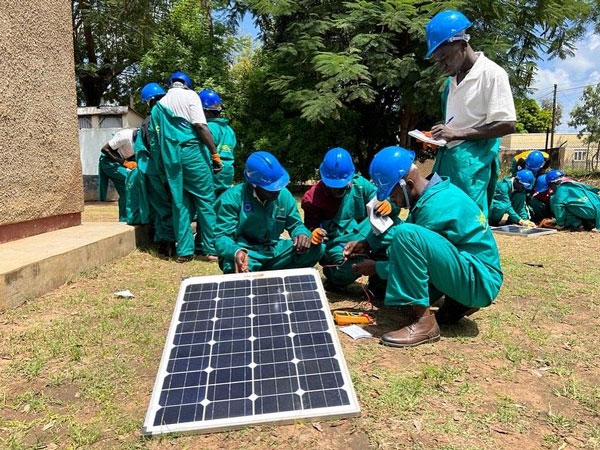
The energy sector has historically been entrenched with gender disparities impacting both representation and compensation, but a new report unveils a notable shift in dynamics fueled by the renewable energy subsector.
SPECIAL REPORT | BIRD AGENCY | Africa’s fast-evolving renewable energy landscape is catalysing a shift in gender dynamics, with more women seizing employment opportunities than in the traditional energy sector, according to a new report.
According to the report, “more women are assuming positions as business creators, energy producers, distributors, and service providers,” challenging longstanding gender norms prevalent in the energy industry.
The report, “Empowering Women in Clean Energy: Advancing and Retaining an Equitable Workforce”, by The Global Energy Alliance for People and Planet draws insights from over 150 female professionals employed at different levels in the renewable energy sector.
Traditionally, the energy sector has been male-dominated, with women representing a mere 16% of its workforce globally, despite constituting 39% of the labour force, according to the IEA. However, in the renewable energy realm, the tide is turning rapidly, with more women assuming roles ranging from entry-level positions to leadership roles, challenging entrenched gender norms.
“A powerful transformation is underway in the African clean energy sector, as companies are making explicit efforts to hire and retain women at every level,” Makena Ireri, the Director of Demand Jobs and Livelihoods at GEAPP, explains.
According to Ireri, this shift is especially significant because “women experience the greatest repercussions of climate change, which amplifies existing gender inequalities.“
From e-mobility companies to off-grid solar solution companies to leading clean energy transition funds, women are proving to be vital drivers of the clean energy transition both at the country level and continentally.
In South Africa, for instance, the Dorper Wind Farm is a prime example of successful women-led ventures in the clean energy sector. Spearheaded by CEO Mamosa May, the 100 MW wind farm is located in the Eastern Cape. There are plans to ramp up generation at the farm to 500 MW of wind power, an achievement that could make it one of the largest wind farms in Africa.
Besides, Rekik Bekele, an Ethiopian woman leader who is the CEO and founder of Green Scene Energy, is also another shining example of women leaders in the renewable energy sector.
Green Scene Energy facilitates farmers’ access to affordable, high quality off-grid solar power. According to their website, they have recently launched a pay-as-you-go scheme partnering with Ethio Telecom.
Such ambitious developments are critical for energy thirst markets such as Ethiopia, where electrification rates are less than 60% and close to 60 million people live without access to electricity, according to Energypedia.
Bekele was listed among the 25 Under 40 Energy Women Rising Stars of 2023 by the Africa Energy Chamber.
Besides, a rising number of women-centered initiatives are offering clean energy solutions, prioritizing female involvement and generating employment opportunities, particularly in lower-level roles.
Solar Sister is one such initiative that recruits, trains and supports women entrepreneurs in rural communities to build businesses that bring solar energy solutions to their communities.
Successful enterprises sell off-grid solar equipment directly to people without power, consequently earning income. According to its website, more than 10,000 successful enterprises have been established by this initiative in Nigeria and Tanzania, its primary markets.
Additionally, M-Kopa, one of the largest PAYG solar service companies in Africa, highlights in its 2023 impact report that 43% of its sales agents across Kenya, Uganda, Nigeria, Ghana and South Africa are women.
More women are expected to be employed in the clean energy sector in the future, with more companies integrating a range of initiatives that promise to upscale their involvement.
The GEAPP report highlights that companies are adopting more inclusive practices such as flexible working hours, implementing safety measures, and hiring women into traditionally male-dominated roles.
“This is due to increased donor interest, the coalescing around gender criteria for investments, and a growing understanding that a more diverse workforce results in improved business outcomes for companies,” the authors of the report explain.
Past inequalities go beyond representation, extending to gaps in wages and earnings. The IEA highlights that in the traditional energy sector set up, the wages of female employees were almost 20% lower than for male employees.
However, according to GEAPP, the earnings of women in the renewable energy sector, especially those in leadership roles, are also improving.
“Women’s earnings average 95% of men’s earnings for similar roles and jobs in the sector,” the report highlights.
A 2023 report by the International Renewable Energy Agency (IRENA) projects that accelerating the energy transition can add 40 million jobs in the energy sector by 2050.
Notably, closing the gender gap in employment could significantly increase GDP and enhance productivity and competitiveness in Africa.
The McKinsey Global Institute has found that if women were to participate in the economy at the same rate as men, their contributions could add as much as USD 28 trillion globally.
****
SOURCE: Bonface Orucho, bird story agency
 The Independent Uganda: You get the Truth we Pay the Price
The Independent Uganda: You get the Truth we Pay the Price





